九年级英语下册Unit4GreatpeopleGrammar学案牛津版
九年级英语下册Unit4LifeonMars讲义(新版)牛津版

Life on Mars(一)重难点精讲—How do you like life on Mars?—I hate it.句中How do you like...? 意为“你觉得……怎么样?”主要用来询问对方对某事的印象,也可以改为“What do you think of ...?”。
hate “讨厌、不喜欢”,后可跟名词、代词、动名词或动词不定式。
题一:翻译:1.—你到目前为止觉得中国怎么样?—目前为止,我觉得很好。
2.我不喜欢周一。
3.我不喜欢看电视,我喜欢阅读。
4.我喜欢游泳,但是不喜欢现在去。
hate 的同义词是________, 反义词是_________。
I thought you liked Mars. 我原以为你喜欢火星。
I thought ...“我原以为……”,是指过去曾有这样的想法,但事实却不是这样。
I think ...是指现在这样认为,往往与事实是相符的。
Help Daniel compare living on Mars to living to Earth at present.句中compare “比为、比作”,常与to连用,意为“比喻、把……比作”,有时也表示“将……同……作比较”。
题二:翻译:1.我认为他是个贼。
2.我还以为他是个贼呢。
3.我们把老师比喻成蜡烛。
4.生活经常被比喻成一盒巧克力。
We will be cared for by robots.我们将由机器人来照顾。
句中care for意为“照顾、照料”,相当于look aft er / take care of。
care for 还可表示“喜欢、愿意”。
题三:翻译:1.我在妈妈不在家的时候经常照顾我的小妹妹。
2.你想喝杯咖啡吗?Food will be in the form of pills.食物将是药丸的形状。
句中in the form of ...的意思是“呈现……形状,处于某种形式”,form意为“形状,形态”。
牛津译林版英语九下Unit2《Greatpeople》(Grammar)说课稿
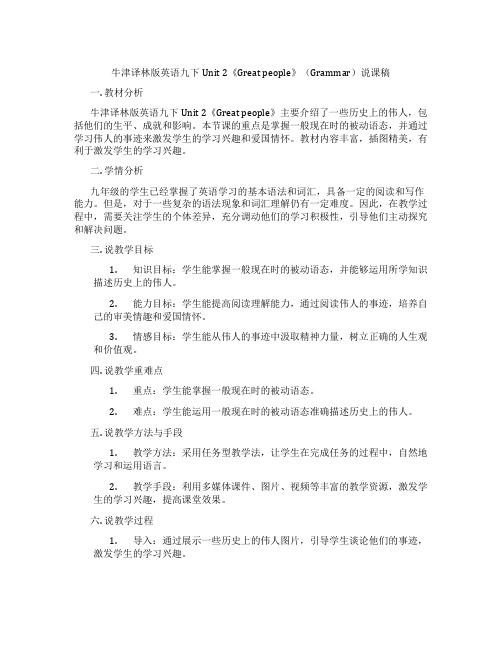
牛津译林版英语九下Unit 2《Great people》(Grammar)说课稿一. 教材分析牛津译林版英语九下Unit 2《Great people》主要介绍了一些历史上的伟人,包括他们的生平、成就和影响。
本节课的重点是掌握一般现在时的被动语态,并通过学习伟人的事迹来激发学生的学习兴趣和爱国情怀。
教材内容丰富,插图精美,有利于激发学生的学习兴趣。
二. 学情分析九年级的学生已经掌握了英语学习的基本语法和词汇,具备一定的阅读和写作能力。
但是,对于一些复杂的语法现象和词汇理解仍有一定难度。
因此,在教学过程中,需要关注学生的个体差异,充分调动他们的学习积极性,引导他们主动探究和解决问题。
三. 说教学目标1.知识目标:学生能掌握一般现在时的被动语态,并能够运用所学知识描述历史上的伟人。
2.能力目标:学生能提高阅读理解能力,通过阅读伟人的事迹,培养自己的审美情趣和爱国情怀。
3.情感目标:学生能从伟人的事迹中汲取精神力量,树立正确的人生观和价值观。
四. 说教学重难点1.重点:学生能掌握一般现在时的被动语态。
2.难点:学生能运用一般现在时的被动语态准确描述历史上的伟人。
五. 说教学方法与手段1.教学方法:采用任务型教学法,让学生在完成任务的过程中,自然地学习和运用语言。
2.教学手段:利用多媒体课件、图片、视频等丰富的教学资源,激发学生的学习兴趣,提高课堂效果。
六. 说教学过程1.导入:通过展示一些历史上的伟人图片,引导学生谈论他们的事迹,激发学生的学习兴趣。
2.新课呈现:介绍一般现在时的被动语态,并通过示例让学生理解其含义和用法。
3.课堂练习:设计一些练习题,让学生巩固所学知识,并及时给予反馈和指导。
4.小组讨论:让学生分组讨论伟人的事迹,并尝试用一般现在时的被动语态进行描述。
5.展示环节:邀请学生上台展示自己的作品,大家共同评价和欣赏。
6.总结:对本节课的内容进行总结,强调一般现在时的被动语态的用法。
7.作业布置:设计一些课后作业,让学生巩固所学知识。
九年级英语下册 9B Unit4 Great people课案 牛津版 教案
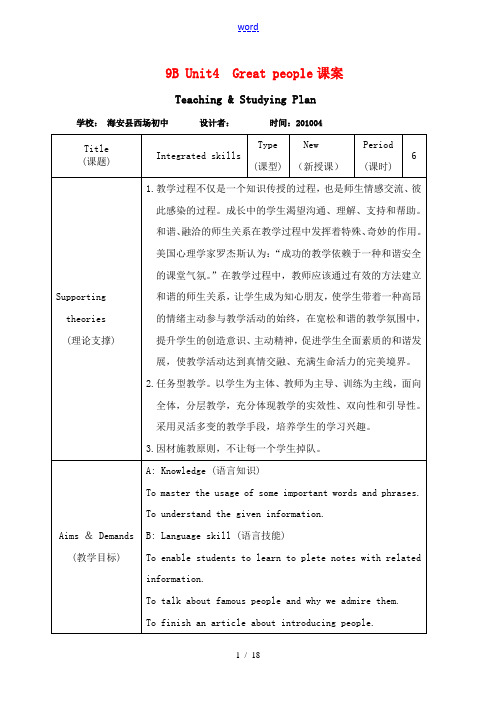
9B Unit4 Great people课案Teaching & Studying Plan学校:海安县西场初中设计者:时间:2010049B Unit 4学案 (Integrated skills) 【学习目标】语言知识:1. 掌握相关的词汇和短语。
2. 学会从人物简介中提取信息。
3. 学会补全笔记。
语言技能:能用所学结构谈论名人以及我们钦佩他们的原因。
情感态度:以名人为榜样,现在努力学习将来为社会多作贡献。
【学习重难点】1. 如何谈论名人以及我们钦佩他们的原因。
2. 完成一篇介绍人物的文章。
课前延伸课前导学练习一、根据中文、首字母提示及句意写出单词。
1. Do you know who invented (X光) machines?2. The future is always (未知的) to us.3. A c only have one child in most cities in china.4. My friend is a F, and he es from Paris.5. Maths is short for .二、收集有关居里夫人的信息,并能通过、文字、图片等进行描述。
自主学习记录卡课内探究课中训练Ⅰ.Read the following information and then answer some questions.Marie Curie was born in the city of Warsaw in Poland. When she was 24, she moved to France and studied mathematics and physics .She married a Frenchman called Pierre Curie there. In 1898, they discovered radium. Marie Curie received the Nobel Prize twice during her lifetime. She died at the age of 67.1.Where was Marie Curie born?2.What did she study in France?3.What were she and her husband famous for?4.How many times did she receive the Nobel Prize?Keys:In the city of Warsaw in PolandMathematics and physicsThe discovery of radiumTwiceⅡ. Finish some of PartA1 with as much information as you can.12. discovering; 18.67Ⅲ.plete the rest of PartA1 after listening.Keys:3. the youngest; 4. Science;14. traffic th JulyⅣ. Use the information in PartA1 to finish PartA3.. Keys: 1.Warsaw in Poland6. Frenchman;7.Nobel Prize;8.radium;9.Second Nobel PrizeⅤ. plete the following dialogue.Millie: Who do you think is the g 1 person that has ever lived?Simon: Neil Armstrong! I a 2 him the most.Millie: What did Neil Armstrong do?Simon: He was the f 3 man that walked on the moon.Millie: Why do you admire him?Simon: Because he was a b4 man to go to a place that was u 5 to humans at that time. What a 6 you? Do you admire anybody?Millie: Yes. I admire Marie Curie. She d 7 radium and i 8 X-ray machines.Simon: Why do you admire her?Millie: Because X-ray machines are now u 9 all over the world to help doctors s lives.Ⅵ. WritingMarie Curie is one of the world’s most famous women.She was bornWe should learn from her..Marie Curie is one of the world’s most famous women.She was born on 7th November 1867. She was born in Warsaw, a city in Poland. She was the fifth and the youngest child of her family. When she was 24, she left Poland and went to Paris to study at a university there. She studied maths and physics. She married a Frenchman called Pierre Curie. The couple won a Nobel Prize for the discovery of radium in 1903. In 1911, she was awarded her second Nobel Prize. She died at the age of 67.We should learn from her. We should study hard today sothat we can do more for the society.课后提升课后提升一、句型转换。
Unit4 重点词汇及词组背诵材料-2021-2022学年牛津译林版九年级英语下册
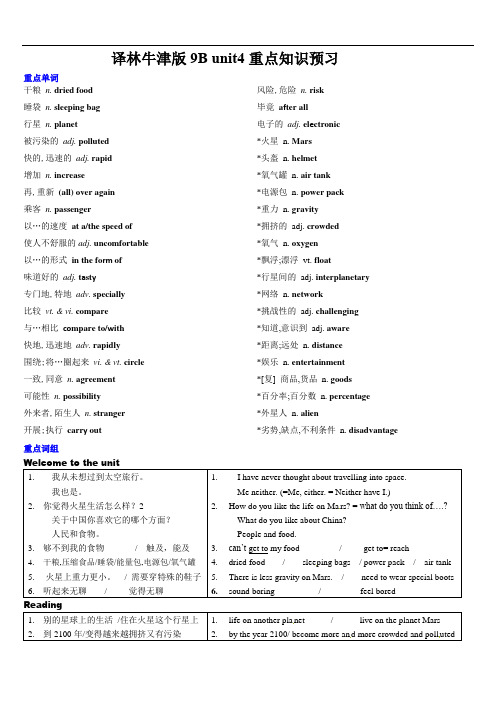
译林牛津版9B unit4重点知识预习重点单词干粮n. dried food睡袋n. sleeping bag行星n. planet被污染的adj. polluted快的,迅速的adj. rapid增加n. increase再,重新(all) over again乘客n. passenger以…的速度at a/the speed of使人不舒服的adj. uncomfortable 以…的形式in the fo rm of味道好的adj. t a st y专门地,特地adv. specially比较vt. & vi. compare与…相比co mpare to/w ith快地,迅速地adv. rapidly围绕;将…圈起来vi. & vt. circle 一致,同意n. agreement可能性n. possibility外来者,陌生人n. stranger开展;执行carr y out 风险,危险n. risk毕竟a f ter all电子的adj. el e ctronic*火星n. Mars*头盔n. helmet*氧气罐n. air tank*电源包n. power pack*重力n. gravity*拥挤的adj. crowded*氧气n. oxygen*飘浮;漂浮vt. float*行星间的adj. interplanetary*网络n. network*挑战性的adj. challenging*知道,意识到adj. aware*距离;远处n. distance*娱乐n. entertainment*[复] 商品,货品n. goods*百分率;百分数n. percentage*外星人n. alien*劣势,缺点,不利条件n. disadvantage重点词组Welcome to the unit1.---我从未想过到太空旅行。
---我也是。
2.你觉得火星生活怎么样?2---关于中国你喜欢它的哪个方面?---人民和食物。
牛津译林版英语九下Unit4GreatpeopleGrammarword特色教案

9B Unit 4 Great peopleGrammar第一部份简要提示一、年级:九年级二、教学内容:9B Unit 4 Great People三、课型:语法课四、教学目标1. 知识目标1) 把握定语从句的概念。
2) 把握定语从句关系代词的用法。
2. 能力目标1) 能够运用定语从句转述信息。
2) 能够运用定语从句描述适当情境。
五、教学重难点1.重点:定语从句结构。
2.难点:定语从句关系代词的用法。
第二部份教学流程历时:15钟Step 1 Defining relative clausesPart one Lead-inT: Hello, everyone! First please look at the picture. Who is he?S:T: All right. He is Neil Armstrong.1. Neil Armstrong is the person who walked on the moon.2. There are reports that say Armstrong and Aldrin saw alien spacecraft.3. It is said that Neil Armstrong sent a message to Mission Control which said that two huge, strange objects landed near them and were watching them.T: These sentences are defining relative clauses. In the first sentence, ‘who walked on the moon’ identifies the noun‘the person’. In the second sentence, ‘that say Armstrong and Aldrin saw alien spacecraft’ identifies the noun ‘reports’. In the third sentence, ‘which said that two huge, strange objects landed near them and were w atching them’ identifies the noun‘a message’.So a defining relative clause identifies the noun before it. We can use ‘who’, ‘which’ or ‘that’ in defining relative clauses.Part Two PracticeT: Now turn to Page 64. Let’s read the conversation between Kitty and Peter and decide whether they are using defining relative clauses. Please underline the defining relative clauses.Peter: Which great people have you decided to write about?Kitty: I may write about Christopher Columbus. Do you think that he’s the greatest explorer in the world? Peter: Yes, I think so. He’s the person w ho discovered America.Kitty: How about you? Tell me the person who you want to write about.Peter: I’m going to write about Pelé. I believe that he’s the best football player that I’ve ever known.Kitty: Yes, I think he is great. Have you found the information which you need for your article?Peter: Not yet, but I’ve found a website that gives a detailed introduction to Columbus. It’ll be very helpful.T: Let’s check the answers.1.He’s the person who discovered America.‘who discovered America’ identifies the noun ‘the person’.2.Tell me the person who you want to write about.‘who you want to write about’ identifies the noun ‘the person’3. I believe that he’s the best football player that I’ve ever kno wn.‘that I’ve ever known’ identifies the noun ‘the best football player’4Have you found the information which you need for your article?‘which you need for your article’ identifies the noun ‘the information’.Step 2 Relative pronounsPart One Lead-inT: We know we can use ‘who’, ‘which’ or ‘that’ in defining relative clauses. Please fill in the brack ets using relative pronounsT: All right.1. Neil Armstrong is the person that walked on the moon.We can also say, Neil Armstrong is the person who walked on the moon.2. There are reports that say Armstrong and Aldrin saw alien spacecraft.There are reports which say Armstrong and Aldrin saw alien spacecraft.T: Why do we use that or who in the first sentence? Why do we use that or which in the second sentence? S:T: Excellent. Because we use ‘who’ or ‘that’ to refer to people and we use ‘which’ or ‘that’ to refer to things. Relative Pronoun people Thingswho √which √that √√T: Please use the correct relative pronouns to fill in the brackets.1. SARS is a terrible disease that/which killed many people.‘a terrible disease’ refers to things.2. Yao Ming that/who plays in NBA is a famous sportsman.‘Yao Ming’ refers to people.3. ‘Harry Potter’ is a good film that/which many children like.‘a good film’ refers to things.Part Two Practice AT: Now let’s look at Page 65, Help Daniel complete his notes with relative pronouns.●The place that / which Bruce Lee was born in was San Francisco.●The person who / that took B ruce to stage when Bruce was only three months old was his father.●The first film that Bruce acted in was made in 1946.●Master Yip Man was the person who / that taught Bruce Kung fu.●‘Game of Death’ was the last film that Bruce acted in.T: Why do we use ‘that’ only in the third and fifth sentences?S:T: All right. Because in defining relative clauses, we use relative pronouns ‘that’ only if the nouns are modified by ‘the first’, ‘the last’ or the superlatives of adjectives. Look at the following sent ences.1) This is the best that has been used against air pollution in cities.2) English is the most difficult subject that you’ll learn during these years.3) He is the last person that I want to see.4) It is the first American movie of this kind that I’ve ever seen.Practice BLet’s read a passage about famous people on Page 67 and find out the wrong relative pronouns, then correct them. Add relative pronouns if they are missing.Millie: Hi, Daniel. The computer who (that)I bought last year isn’t working properly!Daniel: You should take it back. The people which (who) sold it to you should repair it.Millie: Ok, I’ll do that tomorrow. What are you doing now?Daniel: I’m looking at a website about Bruce Lee, my favourite actor.Millie: Oh, he was the actor (who / that) was very good at kung fu. He was one of the famous people which(who / that) Mr. Wu mentioned yeste rday.Daniel: Yes. I think he’s great. His films were very successful and are still popular today. Have you found the information about famous people who(which / that) you can use for the presentation?Millie: I’m looking for information about famous scientists. Do you know the famous American scientist which (who) invented over 1,000 things?Dan iel: Do you mean Thomas Edison?Millie: Yes. He invented the light bulb (which / that) brings light to nearly every home in the world.Daniel: That’s amazing. Did you find out about other scientists which(who/ that) you can talk about ?Millie: Yes, I did. Have you heard of the person which(who / that) worked out E=mc2?Daniel: Yes, I have. That’s Albert Einstein. He was the great scientist (who / that) had funny hair.Practice CPlease join the two sentences with relative pronouns to make defining relative clauses.1)The building is our school. The building stands by the river.The building which / that stands by the river is our school.2)The woma n is speaking at the meeting. The woman is my mother.The woman who / that is speaking at the meeting is my mother.3) I am reading a book. He gave it to me for my birthday present last week.I am reading a book that / which he gave to me for my birthday present last week.4) My favourite film star is Jack C hen. He has acted in many action films.My favourite film star is Jack Chen that / who has acted in many action films.5)I love this city. My parents took me to this city last summer holidays.I love this city that / which my parents took me to last summer holidays.6) The ice-cream is very delicious. I ate it in Beijing.The ice-cream that / which I ate in Beijing is very delicious.Practice DPlease help Millie rearrange the words and add the correct relative pronouns to form correct sentences on Page 66.1) Einstein / is / Germany / The country / was born inThe country which / that Einstein was born in is Germany.2) the theory of relativity / The person / developed / Einstein / isThe people who / that developed the theory of relativity is Einstein.3) Maths and Physics / The subjects / Einstein / studied / wereThe subjects which / that Einstein studied were Maths and Physics.4) worked with / Einstein / very much / The scientists / admired himThe scientists who / that worked with Einstein admired him very much.5) The award / was / Einstein / the Nobel Prize / receivedThe award which / that Einstein received was the Nobel Prize.6) Einstein / The equation / is / E=mc2/ worked outThe equation which / that Einstein worked out is E=mc2.7) the university / Einstein worked in / after / he moved to / Princeton university / the USA /wasPrinceton university was the university that / which Einstein worked in after he moved to the USA.8) was / the greatest scientists / Einstein / one of / lived / in the twentieth centuryEinstein was one of the greatest scientists who / that lived in the twentieth century.9) made to / The contribution / Einstein / unique / modern physics / isThe contribution which / that Einstein made to modern physics is unique.Step 3 HomeworkDo exercises about defining relative clauses in your workbook.第三部份说明本课时是9B Unit 4的Grammar。
Great+people—grammar++重要知识点讲义 牛津译林版英语九年级下册

【Grammar】重点单词1.passage n.章节,乐段2.by hand 手工【Grammar】重点短语1.be used for doing sth. = be used to do sth. 被用于做某事2.a present taste 现在的状态3.daily routine and habits 日常生活和习惯4.one after another = one by one 一个接一个地/相继地;依次地5.at the moment = right now = now 现在,此刻6.at the same time = in the meantime = meanwhile 同时7.present continuous 现在进行时8.work on 致力于;从事9.leave for+地点动身去某地10.in ancient times 在古代11.search for information 搜索信息12.search for 搜索13.the other day 前几天14.at a certain time 在某时15.the whole night = all the night 整晚16.take part in 参加17.the day before yesterday 前天118.have/has been to sp. 去过某地(已回)19.make a great difference to 产生重大影响20.make a difference 有影响;有关系21.in ancient times/in the old days 在古代22.go bad 变质/变坏23.the invention of... ......的发明24.by hand 手工25.with the invention of…随着……的发明26.in the old days 从前27.make sth. + adj. 使某事/某物......【Grammar】重点句子&语法1.I am working on a history project this week. 这周我正在做一个历史课题。
Unit 2 Grammar 基础知识及练习 2021-2022学年牛津译林版九年级英语下册
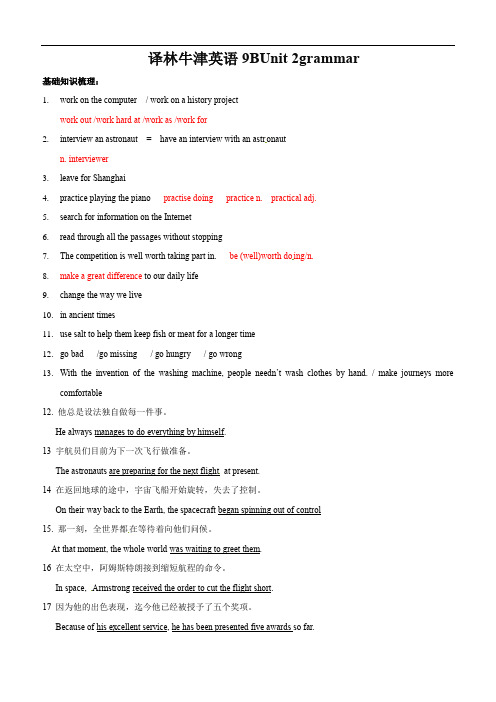
译林牛津英语9BUnit 2grammar基础知识梳理:1.work on the computer / work on a history projectwork out /work hard at /work as /work for2.interview an astronaut = have an interview with an astr onautn. interviewer3.leave for Shanghai4.practice playing the piano practise doing practice n. practical adj.5.search for information on the Internet6.read through all the passages without stopping7.The competition is well worth taking part in. be (well)worth do ing/n.8.make a great difference to our daily life9.change the way we live10.in ancient timese salt to help them keep fish or meat for a longer time12.go bad /go missing / go hungry / go wrong13.With the invention of the washing machine, people needn’t wash clothes by hand. / make journeys morecomfortable12. 他总是设法独自做每一件事。
He always manages to do everything by himself.13 宇航员们目前为下一次飞行做准备。
牛津译林版英语九下Unit 2《Great people》(Grammar)教学设计
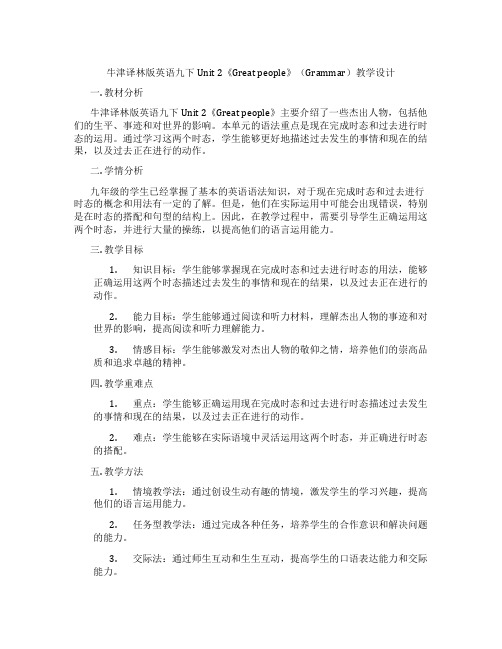
牛津译林版英语九下Unit 2《Great people》(Grammar)教学设计一. 教材分析牛津译林版英语九下Unit 2《Great people》主要介绍了一些杰出人物,包括他们的生平、事迹和对世界的影响。
本单元的语法重点是现在完成时态和过去进行时态的运用。
通过学习这两个时态,学生能够更好地描述过去发生的事情和现在的结果,以及过去正在进行的动作。
二. 学情分析九年级的学生已经掌握了基本的英语语法知识,对于现在完成时态和过去进行时态的概念和用法有一定的了解。
但是,他们在实际运用中可能会出现错误,特别是在时态的搭配和句型的结构上。
因此,在教学过程中,需要引导学生正确运用这两个时态,并进行大量的操练,以提高他们的语言运用能力。
三. 教学目标1.知识目标:学生能够掌握现在完成时态和过去进行时态的用法,能够正确运用这两个时态描述过去发生的事情和现在的结果,以及过去正在进行的动作。
2.能力目标:学生能够通过阅读和听力材料,理解杰出人物的事迹和对世界的影响,提高阅读和听力理解能力。
3.情感目标:学生能够激发对杰出人物的敬仰之情,培养他们的崇高品质和追求卓越的精神。
四. 教学重难点1.重点:学生能够正确运用现在完成时态和过去进行时态描述过去发生的事情和现在的结果,以及过去正在进行的动作。
2.难点:学生能够在实际语境中灵活运用这两个时态,并正确进行时态的搭配。
五. 教学方法1.情境教学法:通过创设生动有趣的情境,激发学生的学习兴趣,提高他们的语言运用能力。
2.任务型教学法:通过完成各种任务,培养学生的合作意识和解决问题的能力。
3.交际法:通过师生互动和生生互动,提高学生的口语表达能力和交际能力。
六. 教学准备1.教师准备:提前准备好相关的教学材料,如PPT、听力材料、阅读材料等。
2.学生准备:学生提前预习课文,了解本节课的主要内容。
七. 教学过程1.导入(5分钟)教师通过展示一些杰出人物的照片,引导学生谈论他们的事迹和对世界的影响,激发学生的学习兴趣。
- 1、下载文档前请自行甄别文档内容的完整性,平台不提供额外的编辑、内容补充、找答案等附加服务。
- 2、"仅部分预览"的文档,不可在线预览部分如存在完整性等问题,可反馈申请退款(可完整预览的文档不适用该条件!)。
- 3、如文档侵犯您的权益,请联系客服反馈,我们会尽快为您处理(人工客服工作时间:9:00-18:30)。
Unit 4 Great peopleGrammar 1学案【学习目标】语言知识:了解并正确使用限定性定语从句。
正确使用关系代词。
语言技能:能够运用限定性定语从句描述适当情境。
情感态度:懂得向伟人学习并热爱自然和生命的重要性。
【学习重难点】1.重点:理解限定性定语从句。
2.难点:正确使用限定性定语从句。
课前延伸课前导学练习Find some defining relative clauses in reading and write them down.1. The man who is standing there is my uncle.2. The pen which I bought yesterday writes well.3. This is the hospital where he was born.小组讨论这些句子有什么特点?课内探究课中训练Let’s do some multiple choices.1.All the children like the teachers can understand them. (2007·长春)A. whichB. whatC. whoseD. whom2.-Have you found the information about famous people you can use for the report.-Not yet. I’ll search some on the Internet.(2007·江西)A. whichB. whoC. whatD. whom3.Do you know the man is sitting behind Nancy. (2007·河北)A. whatB. whichC. whoD. whom4. Shaolin Temple lies in the west of Zhengzhou welcomes the visitors both at home and abroad. ( 2008·河南)A. whereB. whichC. whoD. what5. The book was written by Yu Dan sells well. ( 2008·宁夏)A. whoB. whichC. howD. what6. The camel I rode had a bad temper and I got very tired.(2008·天津)A. thatB. whoseC. whoD. where7. I love people _____are friendly to other s.( 2009·陕西)A. whichB. whoseC. whatD. who8. The ol d diction ary_____ my uncle bought for me is still of great value.( 2009·淮安)A. thatB. whenC. whoseD. where9. I’ve found some pictures of the most interesting places____ you can visit during the winter holidays.(2009·烟台)A. whereB. whichC. whatD. that10. This is the novel_______ is written by Guo Jingming (2009·德州)A. whoB. whatC. thatD. /Keys: 1.D 2. A 3.C 4, B 5. B 6. A 7. D 8. A 9. B 10.C课后提升课后反馈:一、选择题⑴.Many young people prefer the songs ___ have great lyrics.A whichB whoC whereD whom⑵. It’s well known that Zhou Jielun is a singer ___ is popular with the young.A whoseB whomC who⑶.The camel ___I rode had a bad temper, and I got very tired.A thatB whoseC whoD where⑷.---The duty of Project Hope is to help poor children, isn’t it?---Yes, it has built many schools ___those children can study happily.A whereB whenC which⑸.I’m a sports fan .I’m i nterested in everything ___is abo ut the Olympics in Beijing.A thatB whoC whereD when⑹. He keeps a record of everything ____ he had seen there.A.heB.thatC.whichD.whatKeys: 1. A 2. C 3. A 4. A 5. A 6. B二、完形填空(本题共15小题;每小题l分,满分15分)请认真阅读下列短文,从短文后各题所给的A、B、C、D四个选项中,选出最佳选项。
Long ago, a woodcutter fell into a big pit (坑) in the forest. At the 1 were two tiger cubs(幼虎). The sides of the pit were so 2 and steep(陡峭) that the woodcutter couldn’t get out.“When the mother tiger returns, she will surely kill and eat me,” the woodcutter thought.Soon the mother tiger 3 with a recently-killed deer in her jaws. She fed her cubs and threw a piece of meat to the woodcutter, but did not __4___him. Every day for the next month, she leapt out in the morning, ___5___ in the forest and brought food for her cubs. The woodcutter lived on the meat. When the cubs were ___6___ enough, the mother put them on her back and leapt out.“Please don’t ___7_ me!” the woodcutter begged. “I can’t get out by myself!I will starve to death(饿死) here!” The tiger __8___, carrying him out“I owe you my life,” said the woodcutter. “I’ll buy a pig and raise it for you. Meet me at noon by the city’s west gate on the first day of fall.”The woodcutter kept his ___9___ and was ready with the butchered pig at the promised day and time. But the tiger came an hour earlier __10__, went looking for the woodcutter in the city, and was __11__.When the woodcutter realized what had happened, he __12__ the people to free it. “ She saved my life, ‘ he cried. “She should be ___13___ and not killed or kept in a cage!”The woodcutter told his __14__, but nobody believed him. Putting his arms around the tiger’s neck, he said, “if they kill you, they must also kill me!” _15___these words the tiger began to weep. Everyone was so astonished at this that they believed him and freed the tiger.( ) 1. A. corner B. bank C. crossing D. bottom( ) 2. A. dangerous B. soft C. smooth D. hard( ) 3. A. appeared B. hid C. stayed D. served( ) 4. A. discover B. meet C. avoid D. attack( ) 5. A. researched B. collected C. hunted D. practiced( ) 6. A. brave B. happy C. comfortable D. big( )7. A. leave B. beat C. admire D. scold( ) 8. A. came B. arrived C. returned D. went( ) 9. A. promise B. trouble C. truth D. topic( )10. A. in return B. by mistake C. by accidentD. on time( ) 11. A. killed B. enjoyed C. caught D. fed ( )12. A. hated B. begged C. minded D. warned( ) 13. A. believed B. freed C. deserted D. delieved( )14. A. story B. experiment C. business D. fault( ) 15. A. Announcing B. Hearing C. Creating D. RepeatingKeys: 1-5 D C A D C 6-10 DACAB 11-15 CBBABUnit 4 Great people Grammar 1Teaching Record (课堂教学实录)Title (课题):牛津版初中英语9B Unit 4 Great people Grammar 1Period (课时) :Period 4Time (执教时间):26 February, 2010Class (执教班级):Class 4, Grade 9School:Xichang Middle SchoolTeacher (执教老师):Han haipengTeaching Procedures (教学过程):Step I Warming-upT: Hello, everyone! Nice to see you. Today, we are going to learn some usages of the defining relative clauses. First, look at the sentence on the blackboard.T: (板书) Do you know the man who is standing in the front of your classroom?T: Do you understand the meaning of this sentence?S: Yes. 你认识站在你们教室前面的那个男子吗?T: Good. This sentence is a defining relative clause. ‘who is standing in the frontof your classroom’ is used to modify ‘man’.T: A clause is a part of a sentence. The defining relative clause tells us whichperson or thing(or what kind of person or thing) the speaker means.【设计意图】情境设问,导入新授内容定语从句。
